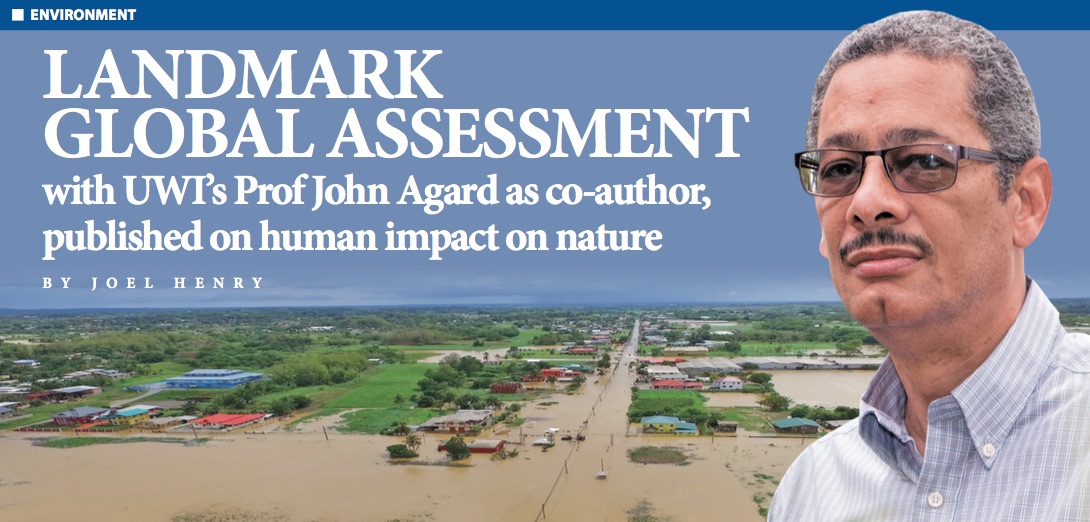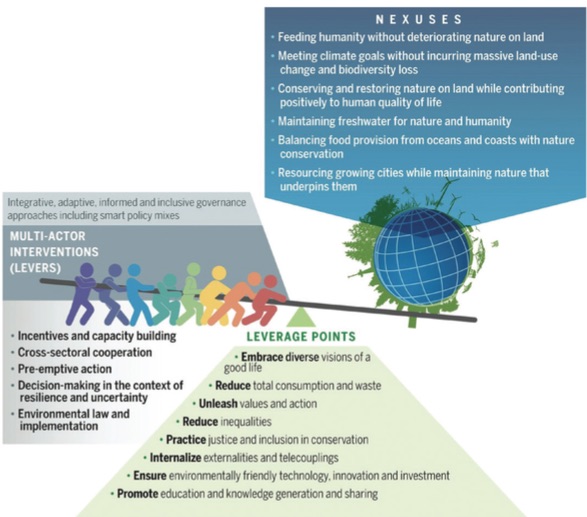
At the time of this writing, a reported 32,400 square miles have burned in Australia, impacting more than estimated half a billion animals and potentially killing millions. A few months earlier (August 2019) massive wildfires engulfed the Amazon in Brazil. They were believed to be caused by farming and logging. In recent years, Trinidad and Tobago has experienced horrendous floods, destroying homes, businesses and national infrastructure. Apart from climate change- related causes such as heavy and prolonged rainfall, experts point to the effects of man on the environment.
Deforestation, unsustainable land practices, species depletion through hunting and fishing, and accidents that damage and kill animals, plants, the land and sea; all around us, for centuries now, we have seen man's impact on the earth and its life. Now a global collective of scholars have completed what has been called the "largest assessment of the state of nature".
Their findings were published in Science, one of the world's premier academic journals. Titled "Pervasive human-driven decline of life on Earth points to the need for transformative change", among the list of authors is The UWI's own Professor John Agard, an internationally-recognised expert on environmental and sustainability issues. Professor Agard is more than a co-author on the report. He is in fact one of the Coordinating Lead Authors of the global assessment of the Intergovernmental Science-Policy Platform on Biodiversity and Ecosystem Services (IPBES), the body responsible for the report.
"The Intergovernmental Panel on Climate Change brought climate change to the fore. The next crisis is biodiversity loss," Agard, who is also Director of UWI St Augustine's Centre for Innovation and Entrepreneurship and Professor of Tropical Island Ecology, explained. "So the model of the Intergovernmental Panel on Climate Change (of which he is also a review editor) was adopted to bring forth the issues surrounding nature and the ecosystem services nature provides to people."

The IPBES Global Assessment Report, released in Science on December, states that "Our comprehensive assessment of status, trends, and possible futures for nature and people suggests that action at the level of direct drivers of nature decline, although necessary, is not sufficient to prevent further deterioration of the fabric of life on Earth."
A reversal of recent declines and a sustainable global future, it says, "are only possible with urgent transformative change that tackles the root causes: the interconnected economic, sociocultural, demographic, political, institutional, and technological indirect drivers behind the direct drivers."
The Summary for Policy Makers (SPM) report, which was approved by 132 governments including Trinidad and Tobago in May 2019, confirmed that a million species of plants and animals risk extinction within a matter of decades; almost three quarters of land and 66 per cent of marine environments have been significantly altered by humanity, and that more than 85 per cent of wetland areas have been lost. It states that many species that are large, slow-growing, habitat specialist or carnivores – such as large cats, large sharks, primates, reef-building corals and woody plants– are declining rapidly.
However, as Professor Agard points out, the report's purpose is to offer solutions to these critical biodiversity issues.
"The IPBES is taking a fresh approach. The starting point of the many governments taking part in this project is to achieve the 17 Sustainable Development Goals (set by the United Nations in 2015). So we are starting from there and working backwards to get there. What do we have to do? How do we have to change human behaviour to achieve these goals? It's called 'back-casting'," Agard says.
The report emphasises five priority interventions ("levers") and eight leverage points for action to address the indirect drivers of social and economic systems (such as demographic, economic, political, and institutional arrangements) where they can make the greatest difference.
The five levers that emerged to bring about this transformative change are: (i) developing incentives and widespread capacity for environmental responsibility and eliminating perverse incentives; (ii) reforming sectoral and segmented decision-making to promote integration across sectors and jurisdictions; (iii) taking preemptive and precautionary actions in regulatory and management institutions and businesses to avoid, mitigate, and remedy the deterioration of nature, and monitoring their outcomes; (iv) managing for resilient social and ecological systems in the face of uncertainty and complexity to deliver decisions that are robust in a wide range of scenarios; and (v) strengthening environmental laws and policies and their implementation, and the rule of law more generally.
Another crucial aspect of the report is that it combines "hard climate science" with the social sciences in developing the levers and leverage points.
Professor Agard says, "half of the team assigned to me were social scientists. It was brilliant. I am accustomed to working only with natural scientists. It limits the thinking. This is new. This process changed my perspective. Sometimes I feel like I am in a time loop. People make the same decisions and we get the same result over and over again. But this new approach emphasises how you get transformative change. You do things differently. You make different decisions."
The report, he says is not about choosing either society or the natural world but rather finding "the right balance between protecting nature and the services nature provides to people."
Despite the fact that the data shows that unsustainable global trends in consumption and economic activity are compromising 80 per cent of the targets under the Sustainable Development Goals, the IPBES report points out that it is not yet too late to make a difference.
"Society has been responding but coordinated and robust international action is needed," a statement from IPBES says.
The statement revealed that parties to the United Nations Convention on Biological Diversity (CBD) have decided that the IPBES Global Assessment Report will form the scientific and technical evidence base for the intergovernmental negotiations in 2020, to agree on a global biodiversity framework for the next decade and to replace the Aichi Biodiversity Targets that expire next year.
The report can be accessed in Science at https://science.sciencemag.org/content/366/6471/eaax3100.